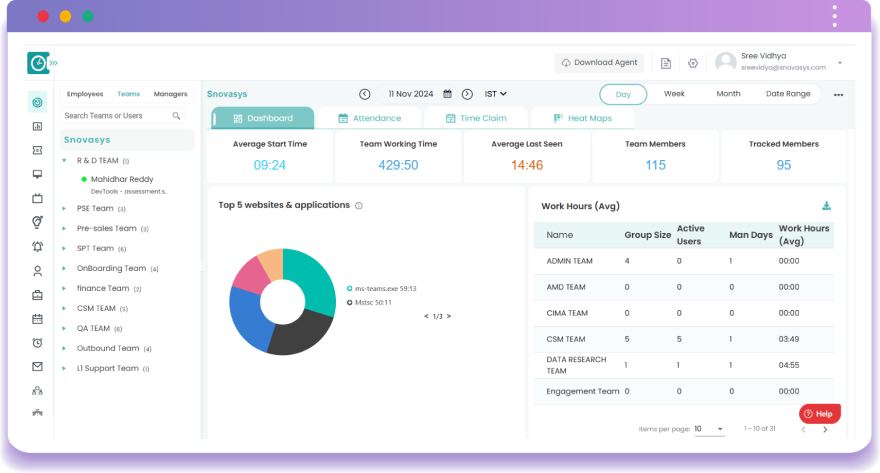The average monthly salary in Poland is 7,590 PLN, which translates to around 1,872.17 USD. While this figure provides a general benchmark, understanding its implications can be tricky. Clarity of the trends will enable professionals to effectively judge their earnings and enable the business to attract and retain top talent. In this article, we’ll break down salary trends in Poland and provide valuable insights for businesses and professionals alike.
What is the Average Salary in Poland?
Average Salary in Poland
An average gross monthly salary in Poland is about 7,590 PLN (1,872.17 USD), equivalent to approximately 91,100 PLN (22471.01 USD) per year. The average general salary covers all kinds of sectors. The industries with higher income are generally IT, finance, and engineering. Larger cities like Warsaw and Kraków offer typically higher wages because of a more thriving economy and work conditions.
Median Salary in Poland
The median salary in Poland is 6,540 PLN (1611.19 USD). That makes the understanding of earnings a bit clearer. This average means half of Polish workers are earning less than this figure while the other half earn more. It is a better and more balanced indicator of earnings as it is not that much affected by the presence of very high and very low salaries.
Minimum Salary in Poland
From January 1, 2024, the gross minimum monthly wage in Poland increased to 4,242 PLN from 3,490 PLN before. Likewise, the minimum hourly rate rose from 22.80 PLN to 27.70 PLN. These measures intend to make wages compatible with the growing cost of living and to pay workers at an appropriate level across all industries. Such an increase forms part of the government’s plan to increase the financial status of low-income working-class employees.
Looking ahead to 2025, further adjustments may occur when the gross minimum wage goes up to 4,666 PLN and the hourly rate could go up to 30.50 PLN. The one-time annual rise is unlike the more popular trend of raising wages bi-annually. The reason behind the decision is because of new inflation forecasts which have forecasted a 5% inflation rate for 2025, higher than what was initially anticipated at 4.1%.
Factors Affecting Salaries in Poland
Salaries in Poland are quite diverse because of the many factors that influence it. These determinants help determine income levels across different professions, industries, and regions. Below are the determinants of salaries in the country.
By Education
Educational qualifications determine salary levels in Poland. The higher the education qualification, the higher the pay scale. Employees with higher education degrees or specializations will be paid higher. Those holding a higher education degree can get 17% more than others.
By Experience
In Poland, experience is considered the most critical determinant of salary. Experts who have had a good number of years of experience will command higher salaries. Data indicates that individuals with 2-5 years of experience can earn up to 32% more than those just entering the job market. So, experienced workers can better negotiate for higher wages and secure advanced roles.
By Location
Location determines how much a worker gets in Poland, while different major cities have variously set income levels. The average annual salaries of significant cities in Poland reflect the different levels of earnings capacity regionally.
| City | Average Annual Salary (PLN) |
|---|---|
|
Gdansk
|
106982
|
|
Kraków
|
105999
|
|
Katowice
|
109851
|
|
Lódz
|
97322
|
|
Poznan
|
97056
|
|
Warsaw
|
115393
|
Source: Salary Expert
By Profession
Earnings potentials for various occupations in Poland vary due to different skills in demand, industrial growth, and requirements in the field. Let’s look at the average annual salary for several of the most common positions in the country.
| Job Role | Average Annual Salary (PLN) |
|---|---|
|
Service
Operations
Manager
|
179,964
|
|
Senior
Technical
Consultant
|
150,000
|
|
Senior
Data
Scientist
|
121,431
|
|
Software
Engineer/Programmer
|
70,986
|
|
Accountant
|
65,789
|
|
HR
Specialist
|
51,500
|
Source: PayScale
By Gender
In Poland, men get 6% more than women on average in all areas of career. This is the case even though there has been a push for equal rights. Women are more often in lower-paying sectors such as education and healthcare. This is one of the factors that lead to the persisting gender pay gap; men are more represented in high-paying sectors like IT and finance.
What is the Cost of Living in Poland?
Generally, the cost of living in Poland is significantly cheaper compared to most of the Western European countries. Key essentials such as accommodation, transport, and food are pretty low as well. Warsaw and Kraków are the only big cities whose costs are high. All the small cities or cities that are on the outskirts are cheaper. Here’s a breakdown of common costs:
| Expense Category | Average Cost (PLN) |
|---|---|
|
Rent
(1-bedroom,
city
center)
|
4,300
|
|
Rent
(1-bedroom,
outside
center)
|
3,300
|
|
Utilities
(monthly)
|
1,200
|
|
Grocery
(1 kg
chicken
breasts)
|
22
|
|
Meal at
a
mid-range
restaurant
|
200
|
|
Public
transport
(one-way)
|
4.40
|
|
Internet
(monthly)
|
66
|
Source: Numbeo
Why Choose Poland for Outsourcing?
Poland outsourcing comes with many advantages, and companies around the world tend to outsource here. These include strong infrastructure, skillful manpower, and a supportive business environment. Key points in detail that have led Poland as an outsourcing destination are highlighted below.
Cost-Effective Solutions
Outsourcing to Poland is highly cost-effective as compared to the Western world. For instance, labor costs in Poland are lower than in countries like Germany or the UK, with average monthly salaries of around 1,200 EUR. This advantage is why Polish outsourcing should be taken into consideration when a firm is looking for ways of optimizing its activities without dropping quality.
High-Level Expertise
Poland has developed a reputation for its skilled workforce, especially when it comes to IT and software development. Poland has over 600,000 IT specialists who can develop a wide range of complex custom software solutions; ScienceSoft is one such example. The country comes third globally in terms of developers’ skills, following China and Russia. Early coding education is well-supported by strong mathematics and science results. Polish developers excel in areas such as algorithms, security, and databases.
Strategic Location
Poland is very central to Europe, so great access for businesses to key European markets would be granted. It allows free cross-border collaboration and simple logistics with this strategic positioning. Besides, the favorable time zone alignment with Western Europe prevents the issue of time difference.
Poland stands out as an ideal outsourcing destination, combining affordability, high quality, and a skilled workforce. Its central location and supportive business climate make it perfect for streamlining business operations efficiently.
How Time Champ Enhances Outsourcing Efficiency?
Time Champ is a time tracking and productivity software that offers a comprehensive solution for businesses looking to outsource effectively. It simplifies workforce management while ensuring transparency, accountability, and efficiency. Here’s how Time Champ supports your outsourcing needs:

1. Centralized Workforce Management
Time Champ provides a single platform to manage your outsourced team’s attendance, working hours, and tasks. It eliminates the need for juggling multiple tools, giving you a clear overview of your workforce. Whether your team is in-house, remote, or outsourced, Time Champ keeps everything organized and accessible.
2. Real-Time Insights
Get instant updates on the performance and productivity of your outsourced team with Time Champ’s real-time analytics. These insights help you identify strengths, address inefficiencies, and make informed decisions that drive better results. You’ll always have a clear picture of your team’s progress.
3. Secure and Transparent
Trust and security are vital components of successful outsourcing, and Time Champ fulfills them. They ensure advanced data protection that involves transparency in the activity of teams. This consequently enhances a great working relationship with the outsourced partners while safeguarding sensitive information.
Time Champ converts the outsourcing process into a streamlined, efficient, and accountable process. With Time Champ, you can scale your business while leaving the workforce management to a trusted solution.
Empower your workforce and enhance efficiency with Time Champ
Begin your journey today!
Signup for FreeBook DemoConclusion
Poland stands out as a lively employment hub and an outsourcing center due to its dynamic labor market, strategic advantages, and deep professional expertise. Its strong professional expertise, cultural compatibility, and developing infrastructure for outsourcing make it the most attractive destination for businesses in the world. Whether a country seeks Poland as a location for its working professionals or is seeking growth and innovation as an outsourcing location, Poland is always in focus. n
Frequently Asked Questions
A “good salary” depends on the area, occupation, and personal levels of consumption. In such big cities as Warsaw or Kraków, 10,000 PLN/month and more should be pretty good, allowing the living well. In other cities smaller in size or on the land, 6,000–8,000 PLN a month is fine since these costs are lower in smaller locations. Other factors about the amount of housing, traffic, and personal money goals help decide for the person whether such an income is “good”.
Warsaw, the capital, is the most expensive city in Poland. As the economic and cultural hub of the country, it has the highest living costs, including housing, transportation, and dining. The other cities, such as Kraków and Wroclaw, also have rather high living costs; however, Warsaw is still the most expensive city of all.
The highest remunerations in Poland exist for IT and technical professionals. One of the highest paying is for the Network Engineers who are said to earn between 79,200 USD and 118,800 USD annually. Other professions paying above average include Construction Managers from 63,200 USD and 102,800 USD and Data Analysts who draw 55,600 USD up to 86,300 USD annually. These positions describe the financial potential in Polish job markets in specialization and demand.







